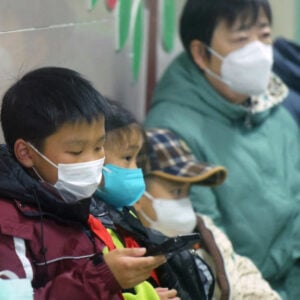
Chinese Star an Angel to Animals

The animal rights group People for the Ethical Treatment of Animals – PETA – launched its new campaign „Be an angel, don’t wear fur.“
Their star attraction is Chinese actress Sun Li who rose to fame through popular television dramas.
Li posed in wings with a white rabbit in order to encourage China’s one-billion-strong population not to wear fur.
[Sun Li, Actress]:
„Today, the methods used to obtain furs are really cruel. But because people want these precious furs they will sometimes skin them alive and that is an even crueler method. Even when the animals don’t have skin, they can still feel and move. There really aren’t any ethical ways to do it. So I hope that everyone, especially in the wintertime, when they feel warmth, will let other things feel warmth, and not wear fur.“
PETA says its new anti-fur campaign results from a recent investigation into the conditions of Chinese fur farms.
They say they discovered ‚awful conditions,’ with animals often being skinned alive.
China is a major exporter of fur garments and the number of fur farms has mushroomed in the past ten years, especially in the cold northern region of Heilongjiang.
According to local industry experts, the level of fur production in northeastern China has been increasing steadily by 10 percent per year since 2004.
Many of the buyers come from neighboring Russia, where many people bulk up against the bitter winter by wearing fur.
[Sun Li, Actress]:
„Because I’m Chinese, I hope to use my language and my feelings to tell my country’s people that perhaps they can use other methods to beautify themselves and keep themselves warm and not use fur.“
According to a China Leather and Fur Association forum in November 2007, a growing number of international fur traders, processors and fashion designers have gradually shifted their business to China.
 Foto: NTDTV
Foto: NTDTV


![SPD-Bundesparteitag: Reden von Scholz und Klingbeil zur bevorstehenden Wahl [Livestream]](https://images-de.epochtimes.de/uploads/2025/01/Thumb-SPD-Bundesparteitag-v2-400x225.jpg)
























vielen Dank, dass Sie unseren Kommentar-Bereich nutzen.
Bitte verzichten Sie auf Unterstellungen, Schimpfworte, aggressive Formulierungen und Werbe-Links. Solche Kommentare werden wir nicht veröffentlichen. Dies umfasst ebenso abschweifende Kommentare, die keinen konkreten Bezug zum jeweiligen Artikel haben. Viele Kommentare waren bisher schon anregend und auf die Themen bezogen. Wir bitten Sie um eine Qualität, die den Artikeln entspricht, so haben wir alle etwas davon.
Da wir die Verantwortung für jeden veröffentlichten Kommentar tragen, geben wir Kommentare erst nach einer Prüfung frei. Je nach Aufkommen kann es deswegen zu zeitlichen Verzögerungen kommen.
Ihre Epoch Times - Redaktion